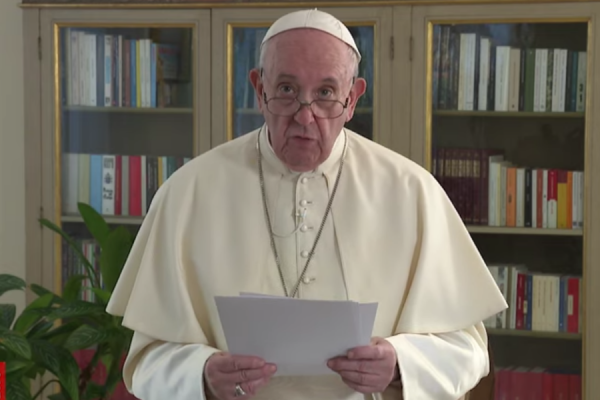In the United Nations message, Pope Francis denounces abortion and family breakdown

Pope Francis told the United Nations on Friday that denying the existence of human life in the womb through abortion does not solve the problems.
"Unfortunately, some countries and international institutions are also promoting abortion as one of the so-called 'essential services' provided in the humanitarian response to the pandemic," Pope Francis said in his speech to the UN on 25 September.
"It is worrying to see how simple and convenient it has become for some to deny the existence of a human life as a solution to the problems that can and must be solved for both the mother and her unborn child," the pope said.
Speaking at the high-level meeting of the United Nations General Assembly via a video message, Pope Francis said that the problem of today's "throwaway culture" is rooted in a lack of respect for human dignity.
"At the origin of this 'throwaway culture' there is a serious lack of respect for human dignity, the promotion of ideologies with reductive conceptions of the human person, a denial of the universality of fundamental human rights and a desire for power and absolute control which is widespread in today's society. Let's call it what it is: an attack on humanity itself, ”he said.
“It is indeed painful to see the number of fundamental human rights that continue to be violated with impunity today. The list of such violations is really long and gives us a frightening picture of a humanity that is mistreated, wounded, deprived of dignity, freedom and hope for the future, ”he continued.
“As part of this picture, religious believers continue to endure all kinds of persecution, including genocide, because of their beliefs. We Christians are also victims of it: how many of our brothers and sisters in the world are suffering, sometimes forced to flee their ancestral lands, cut off from their rich history and culture ”.
Pope Francis urged world leaders to be particularly attentive to children's rights, "in particular their right to life and education", acclaiming the example of Malala Yousafzai, the young Pakistani advocate of women's education.
He reminded the UN that every child's first teachers are his mother and father, adding that the Universal Declaration of Human Rights describes the family as "the natural and fundamental group unit of society".
"Too often the family is the victim of forms of ideological colonialism that weaken it and end up producing in many of its members, especially the most vulnerable - the young and the elderly - the feeling of being orphans and rootless," Pope said. Francis.
"The collapse of the family echoes the social fragmentation that hinders our efforts to confront common enemies," he added.
In his speech, Pope Francis said that the coronavirus pandemic had highlighted the urgent need to "make every person's right to basic medical care a reality" and highlighted "the rapidly growing inequality among the super rich. and the poor permanently ".
“I think about the effects of the pandemic on employment… There is an urgent need to find new forms of work that are truly capable of realizing our human potential and affirming our dignity,” he said.
“To ensure decent employment, there needs to be a shift in the prevailing economic paradigm, which seeks only to expand corporate profits. Offering work to more people should be one of the main objectives of every company, one of the criteria for the success of the productive activity “.
Inviting the international community to "put an end to economic injustices", the pope instead proposed an economic model that "encourages subsidiarity, supports economic development and invests in education and infrastructure for the benefit of local communities".
The Pope also renewed his appeals for priority to be given to the poorest and most vulnerable in an attempt to guarantee access to COVID-19 vaccines and for the forgiveness of the debt of the poorest nations.
For the first time in its history, the United Nations General Assembly is virtual this year, with world leaders providing pre-recorded observations via video link due to coronavirus restrictions on travel to New York. The UN celebrates the 75th anniversary of its foundation this week.
This was Pope Francis' second speech to the United Nations General Assembly in the seven years since his election. It was the sixth time that a pope had addressed the UN, after Pope Paul VI in 1964, Pope John Paul II in 1979 and 1995 and Pope Benedict XVI in 2008.
In his video message, the pope expressed strong support for multilateralism, that is, the partnership between several countries that pursue a common goal.
“We have to break with the current climate of mistrust. We are currently witnessing an erosion of multilateralism, all the more serious in light of the development of new forms of military technology, such as lethal autonomous weapons systems (READS) that irreversibly alter the nature of warfare, further detaching it from human agency ", he warned .
The pope said recovery from the coronavirus pandemic represented a choice between two avenues.
"A path leads to the consolidation of multilateralism as an expression of a renewed sense of global co-responsibility, a solidarity based on justice and the achievement of peace and unity within the human family, which is God's plan for our world" , he has declared. .
“The other path emphasizes self-sufficiency, nationalism, protectionism, individualism and isolation; it excludes the poor, the vulnerable and those who dwell on the edge of life. That path would surely be detrimental to the entire community, causing self-inflicted injuries to all. It must not prevail. "